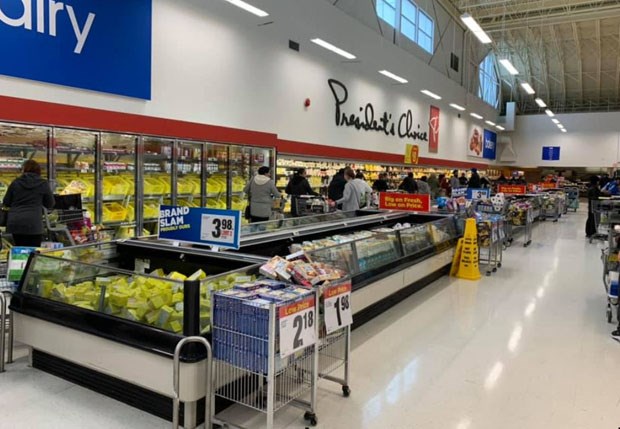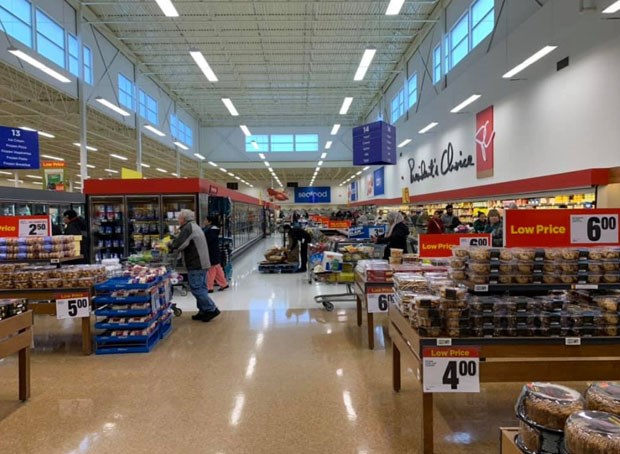Business has been brisk during the pandemic for the Real Canadian Superstores in Coquitlam.
Operating stores out of Westwood Mall near Coquitlam Centre, as well as another off Lougheed Highway, the Superstore has seen long lines of customers in Coquitlam during the COVID-19 outbreak as people feared food (and toilet paper) shortages.
But despite these sales, Superstore owner Lowblaw - Canada's largest grocer –actually saw its net income fall in its most recent quarter, despite revenue growth, because of costs related to working through the COVID-19 pandemic, including a temporary pay bump – known by many as “Hero Pay” - for workers and investments into its e-commerce business.
At the start of its second quarter, Loblaw Companies Ltd. was just moving past unprecedented volumes as consumers stocked up on food and cleaning supplies, said president Sarah Davis during a conference call with analysts.
The quarter was marked by inconsistent buying patterns, she said.
"The quarter ended with the gradual easing of restrictions and the general sense that we were establishing a new normal," said Davis. "We fared well with strong underlying performance in the face of unexpected challenges."
Loblaw's revenue for the three months ended June 13 rose 7.4 per cent to nearly $12 billion, from $11.1 billion in the second quarter of 2019.
Davis called that "substantial, but uneven" with inconsistent growth in its food business and negative pressure on its drug business.
At the company's food stores, same-store sales — a key retail metric — increased 10 per cent. During the quarter, demand shifted to its conventional store formats with the market division's same-store sales increasing 18.8 per cent, while the discount division gained 4.9 per cent.
"We are already seeing the start of a return to discount," noted Davis, "and we expect that to quicken if the economy tightens in any meaningful way."
Same-store sales at Loblaw's drug division, meanwhile, declined 1.1 per cent. Front-store sales grew 3.3 per cent, while pharmacy sales fell 6.2 per cent.
The company also saw increased costs related to the COVID-19 pandemic.
It spent an estimated $282 million during the quarter on safety measures for staff and customers with about $180 million in temporary pay premiums which included a one-time bonus for store and distribution centre colleagues of $25 million.
Loblaw, along with competitors Empire Co. Ltd. and Metro Inc., ended their so-called pandemic pay programs as of June 13.

The House of Commons standing committee on industry, science and technology called Davis and executives from Empire and Metro to a hearing earlier this month where they defended the choice to end the program and said the decisions were independently made despite communicating with each other before launching and ending the programs.
When asked if she expects to be called to answer more questions, Davis said she doesn't expect that.
"They asked their questions. We answered them. And, as far as I'm concerned, it's done," she said, adding "anything is possible."
She said she has had no interactions with regulators as a result of the hearing.
The grocer is continuing to see costs related to COVID-19 with about $20 million spent in the first four weeks of the third quarter.
These costs are "down significantly" from the roughly $90 million spent every four weeks in the second quarter now that the temporary pay program has ended, wrote Chris Li, an analyst with Desjardins, in a note.
"We expect this to drive improved profitability," he wrote.
Loblaw also experienced a surge in demand for its e-commerce options so far during the pandemic, which created additional costs.
The company's e-commerce business grew 280 per cent in the quarter, Davis said. So far this year, Loblaw has totalled $1.2 billion in e-commerce sales to surpass its 2019 full-year total of $1 billion.
"We are on a run rate of sales that we did not expect for years."
The company scaled its program, including adding several micro-fulfilment centres, adding costs that were expected to come later.
"This creates a short-term headwind with long-term promise."
- With files from the Canadian Press



